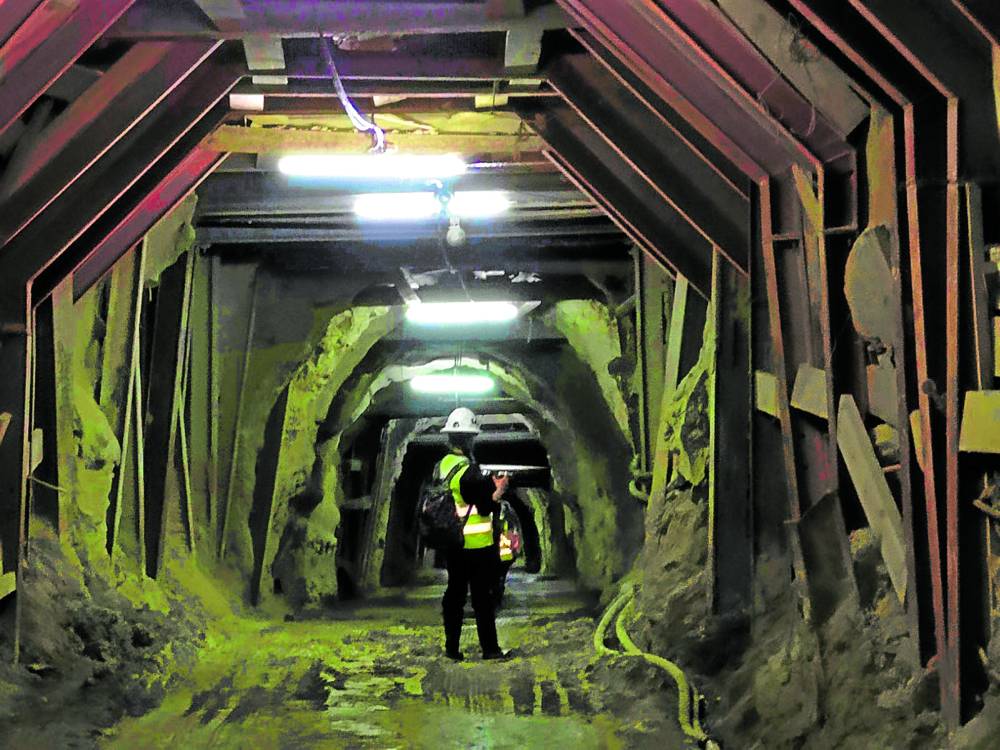SC to mining firm: Get consent of Benguet IPs

UNDERGROUND TOUR A group of visitors tours a mining tunnel of Lepanto Consolidated Mining Co., one of the country’s top gold producers, in Mankayan, Benguet, in this 2018 photo. Lepanto, which started operations in the 1930s, is among the Philippines’ pioneer mines. —EV ESPIRITU
BAGUIO CITY—The Supreme Court sitting en banc has terminated a 2015 arbitral ruling which exempted gold and copper miner Lepanto Consolidated Mining Co. from securing the free, prior and informed consent (FPIC) of ancestral domain dwellers in Benguet’s Mankayan town when it applied for the 25-year renewal of its mineral production sharing agreement (MPSA) seven years ago.
Lepanto, one of the country’s oldest mines, began renewal proceedings as early as 2014 before its MPSA No. 001-90 lapsed on March 2015, and was told that it needed the consent of Mankayan’s indigenous peoples (IPs), according to letters exchanged between the mine, and the Cordillera offices of the Mines and Geosciences Bureau (MGB) and the Department of Environment and Natural Resources (DENR).
The firm operates a mine site that overlaps with Mankayan lands covered by a Certificate of Ancestral Domain Title granted to its Kankanaey community.
But Lepanto had argued that the FPIC was not among the “same terms and conditions” for a possible renewal when it granted the firm its first MPSA in 1990.
The consent of indigenous Filipino communities are required by Republic Act No. 7942 (Philippine Mining Act of 1995) and RA 8371 (Indigenous Peoples’ Rights Act of 1997 or Ipra) which became laws after Lepanto acquired its original MPSA.
Lepanto had asked for arbitration, and an ad hoc arbitration tribunal ruled on Nov. 27, 2015, that the mine did not need to comply with the FPIC precondition which the arbiters had characterized as an “unfavorable future legislation requirement” that would impair the company’s “vested rights to renew [its] MPSA.”
Public policy
However, in a decision that was promulgated on June 21 and made public only on Dec. 22, the high court said the arbitration tribunal contradicted “a strong and compelling public policy on the protection of the rights of the Mankayan indigenous cultural communities to their ancestral domains” when it excused Lepanto from acquiring the FPIC.
The Supreme Court decision, penned by Associate Justice Henri Jean Paul Inting, stresses that protecting the “rights of indigenous cultural communities to their ancestral lands to ensure their economic, social, and cultural well-being, is a Constitutionally declared policy of the State.”
Lepanto had yet to issue a statement on the Supreme Court decision. But MGB Cordillera director Fay Apil said on Wednesday that the company had chosen to continue the renewal process, and had asked her agency for an endorsement to secure the FPIC.
Lepanto also disclosed the court’s decision in a Dec. 21 report to the Securities and Exchange Commission.
Although its first MPSA had technically ended in 2015, Lepanto continued to operate on the strength of the arbitral decision, MGB sources said.
Deemed renewed
According to the Supreme Court, the arbitral decision states that the MPSA is “already deemed renewed” because the MGB Cordillera office in 2015 “found Lepanto to have substantially complied with all requirements for the joint renewal of the agreement, save for the new imposition of FPIC and [a] Certification Precondition [to be issued by the National Commission on Indigenous Peoples] under the Ipra.”
In a separate opinion, Associate Justice Marvic Leonen pointed out that the rights arising from the MPSA ended when the agreement lapsed.
“As pointed out by Chief Justice Alexander Gesmundo during our deliberations, an arbitral award is against public policy if ‘its enforcement would be against our State’s fundamental tenets of justice and morality or blatantly be injurious to the public or the interests of the society,’” Leonen said.
The Supreme Court sided with the Court of Appeals (CA) in dismissing a “motion to intervene” that was filed by then Benguet Rep. Ronald Cosalan, who challenged the arbitral decision in 2017.
Cosalan, in an interview on Wednesday, said he had a stake in the case being a member of Benguet’s indigenous community and as one of the authors of the Ipra.
Earlier in 2016, the DENR and the MGB also sued and won a favorable ruling from a Makati Regional Trial Court (RTC) which “vacated” the arbitral decision, but the CA reversed the RTC decision also in 2018.
However, the high court agreed with the RTC decision that also described consent from IPs as public policy. INQ
RELATED STORIES
Benguet’s oldest mines step up work to help PH recovery
Coalition of small miners wants access to all kinds of minerals